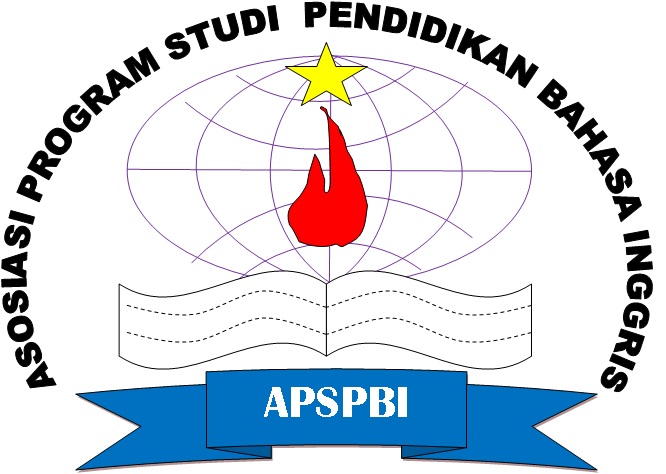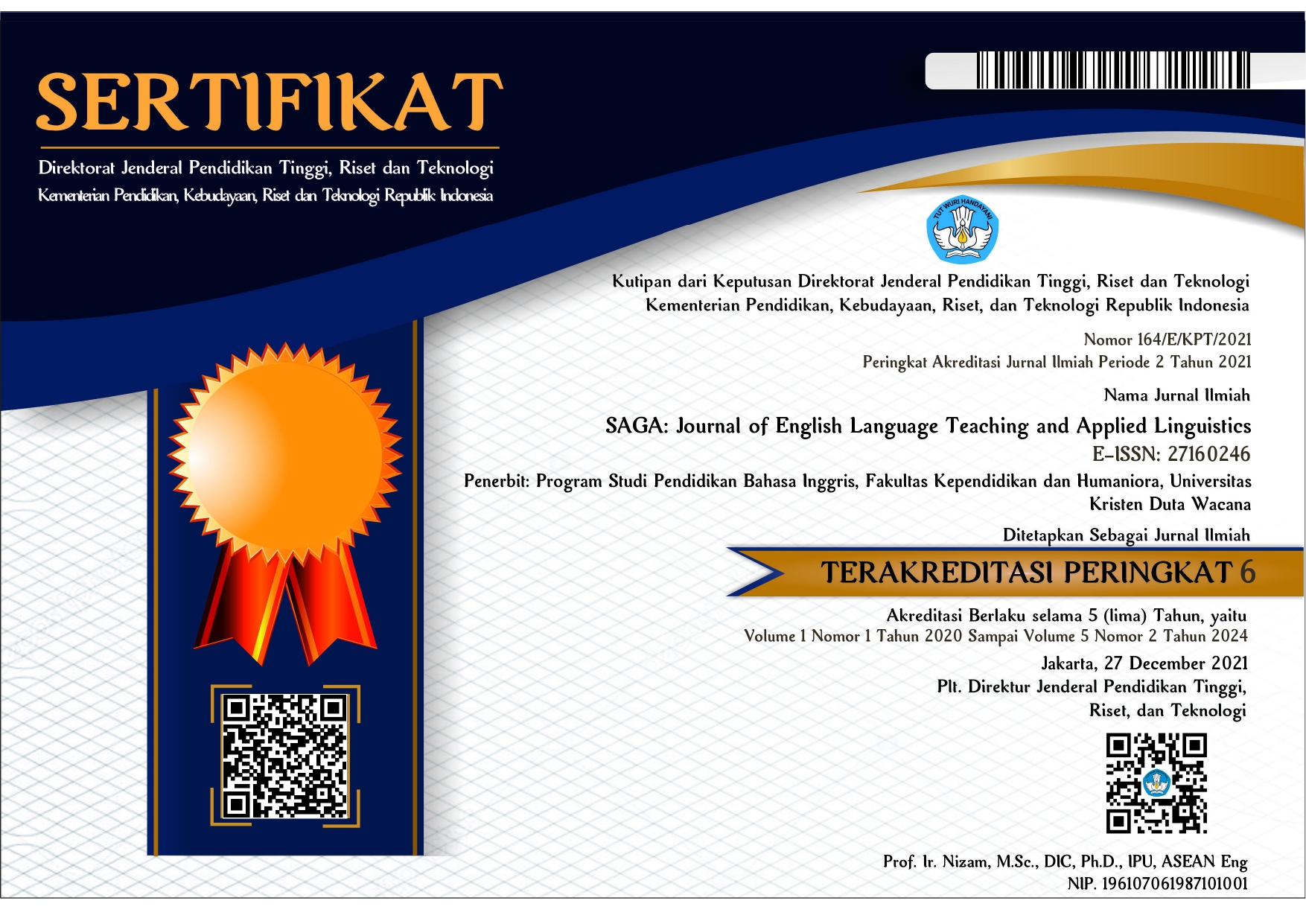The Effectiveness of Memory Strategies to Improve Students' Speaking Skills
DOI:
https://doi.org/10.21460/saga.2024.52.195Keywords:
learning strategies, memory strategies, vocabularyAbstract
This research studies the memory strategies used by the second semester STAI Ma’arif Magetan students to improve their speaking skills through involvement in English vocabulary. The purpose of this research is to find out the types of strategies and students' preferences in using strategic memory to improve their speaking skills. The data consists of memory strategies used by STAI Ma’arif Magetan students. The data source consisted of 30 second semester students. The memory strategy questionnaire was carried out for the data collection process. Data analysis was carried out using several steps such as data reduction, displaying data, and drawing conclusions. The research results showed: (1) students used ten indicators of strategic memory (grouping, associating, placing new words into a context, using images, semantic solvers, using keywords, representing sounds in memory, structural displays, using physical responses or sensation, and using mechanical techniques); (2) students' preferences in using memory strategies to place new words into context.
References
Abdelghani, A., & Ibrahim, M. (2017). Impact of utilizing semantic maps strategy on the development of English language vocabulary learning for Saudi secondary schools’ students. International Journal of Humanities, Social Sciences and Education, 4(11), 183–196. https://doi.org/10.20431/2349-0381.0411022
Aguila, K. B., & Harjanto, I. (2016). Foreign language anxiety and its impacts on students’ speaking competency. ANIMA Indonesian Psychological Journal, 32(1), 29–40. https://doi.org/10.24123/aipj.v32i1.582
Ahtif, M.H., & Gandhi, N. (2022). The role of language in cross-cultural bonds. Journal of Asian Multicultural Research Fot Social Sciences Study, 3(4), 7–16.
Aini, N. (2023). Exploring the effectiveness of hilokal application on speaking skill development for college students. The Annual International Conference on Education, 1, 10–318.
Alek. (2021). Embracing High-Order Thinking Skills (HOTS) in learning English as a Foreign Language (EFL).
Andrulis, D. & Brach, C. (2007). Integrating literacy, culture, and language to improve health care quality for diverse populations. Am J Health Behav. 2007 ; 31(Suppl 1). https://doi.org/10.5555/ajhb.2007.31.supp.S122.
Asyhar, W. I. (2019). Case study of second language acquisition: What contributes to speaking proficiency. Inovatif: Jurnal Penelitian Pendidikan, Agama Dan Kebudayaan, 5(1), 95–108.
Atay, D., & Ozbulgan, C. (2007). Memory strategy instruction, contextual learning and ESP vocabulary recall. English for Specific Purposes, 26(1), 39–51. https://doi.org/10.1016/j.esp.2006.01.002
B. Beribe, M. F. (2023). The impact of globalization on content and subjects in the curriculum in Madrasah Ibtidaiyah: Challenges and opportunities. At-Tasyrih: Jurnal Pendidikan Dan Hukum Islam, 9(1), 54–68. https://doi.org/10.55849/attasyrih.v9i1.157
Babu, & Roy, A. (2023). Educational paradigms in perspective: While teachers and students evaluate outcome-based and traditional educational approach. December.
Batang, N. T. (2016). Teaching of English as a foreign language. TEFL Overseas Journal, 2(1), 105–128. http://journals.ukitoraja.ac.id/index.php/ojtefl/article/download/232/194/
Bridgard, F de, Sinnot-Armstrong, W. (eds.). (2022). Neuroscience and Philosophy 1st ed. MIT Press.
Chen, X., & Padilla, A. M. (2019). Role of bilingualism and biculturalism as assets in positive psychology: Conceptual dynamic GEAR model. Frontiers in Psychology, 10(SEP). https://doi.org/10.3389/fpsyg.2019.02122
Cohen, L., Manion, L., & Morrison, K. (2007). Research methods in education. In Research Methods in Education. https://doi.org/10.4324/9780203029053
Crystal, D. (2003a). English as a global language (2nd ed.). Cambridge University Press.
Crystal, D. (2003b). Language choices: English as a global language. In The Palgrave Handbook of Economics and Language (2nd ed.). Cambridge University Press. https://doi.org/10.1007/978-1-137-32505-1
Daar, G. F. (2020). Problems of English language learning in context ( based on some studies in Manggarai).
Darling-Hammond, L., Flook, L., Cook-Harvey, C., Barron, B., & Osher, D. (2020). Implications for educational practice of the science of learning and development. Applied Developmental Science, 24(2), 97–140. https://doi.org/10.1080/10888691.2018.1537791
Ellis, R. (1997). The Study of second language acquisition (1st ed.). Oxford University Press.
Elo, S., Kääriäinen, M., Kanste, O., Pölkki, T., Utriainen, K., & Kyngäs, H. (2014). Qualitative content analysis. SAGE Open, 4(1), 215824401452263. https://doi.org/10.1177/2158244014522633
Europe, G. C. of. (2021). Common of European framework of reference for languages: learning, teaching, assesment. In English Language Teaching (1st ed.). Cambridge University Press. https://jurnal.unikal.ac.id/index.php/jelle/article/view/992%0Ahttp://jurnalnasional.ump.ac.id/index.php/aplinesia/article/view/12080%0Ahttps://proceeding.unnes.ac.id/index.php/iset%0Ahttp://dx.doi.org/10.33578/pjr.v7i1.9127.%0Ahttp://i-lib.ugm.ac.id/jurn
Fitriani, R. L. (2022). The Development of English speaking proficiency to increase students’ communication skill in a business and technology college. Komversal, 4(2), 90–112. https://doi.org/10.38204/komversal.v4i2.1041
Gholam, A. (2019). Inquiry-based learning: Student teachers’ challenges and perceptions. Journal of Inquiry & Action in Education, 10(2), 2019.
Ghorbani, M. R., & Riabi, N. K. (2011). The impact of memory strategy instruction on learners’ EFL vocabulary retention. Theory and Practice in Language Studies, 1(9), 1222–1226. https://doi.org/10.4304/tpls.1.9.1222-1226
Gilakjani, A. P., Lai-Mei, L., & Sabouri, N. B. (2012). A study on the role of motivation in foreign language learning and teaching. International Journal of Modern Education and Computer Science, 4(7), 9. https://doi.org/10.5815/ijmecs.2012.07.02
Gleason, B. L., Peeters, M. J., Resman-Targoff, B. H., Karr, S., McBane, S., Kelley, K., Thomas, T., & Denetclaw, T. H. (2011). An active-learning strategies primer for achieving ability-based educational outcomes. American Journal of Pharmaceutical Education, 75(9), 186. https://doi.org/10.5688/ajpe759186
Halali, A. A. S., Ismail, L., Samad, A. A., Razali, A. B., & Noordin, N. (2022). Challenges in academic speaking for non-native speakers: The case of Libyan students studying in Malaysia. Pertanika Journal of Social Sciences and Humanities, 30(December), 43–62. https://doi.org/10.47836/PJSSH.30.S1.03
Hattie, J. A. C., & Donoghue, G. M. (2016). Learning strategies: a synthesis and conceptual model. Npj Science of Learning, 1(1). https://doi.org/10.1038/npjscilearn.2016.13
Jasno. (2022). Communicative competence in teaching speaking. Korean Linguistics, 8, 1–24. https://doi.org/10.1075/kl.8.04blh
Kazu, I. Y., Kazu, H., & Ozdemir, O. (2005). The effects of mastery learning model on the success of the students who attended “usage of basic information technologies” course. Educational Technology and Society, 8(4), 233–243.
Keiler, L. S. (2018). Teachers’ roles and identities in student-centered classrooms. International Journal of STEM Education, 5(1). https://doi.org/10.1186/s40594-018-0131-6
King, L. (2018). The Impact of multilingualism on global education and language learning. Cambridge Assessment English, 1–40. https://assets.cambridgeenglish.org/research/perspectives-multilingualism.pdf
Lauder, A. (2008). The status and function of English in Indonesia: A review of key factors. Makara Human Behavior Studies in Asia, 12(1), 9. https://doi.org/10.7454/mssh.v12i1.128
Leong, L., & Ahmadi, M. S. (2017). An analysis of factors inluencing learners’ English speaking skill. International Journal of Research in English Education, 2(1), 34–41. http://ijreeonline.com/files/site1/user_files_68bcd6/sma1357-A-10-26-1-fefa0eb.pdf
Luis, C. L. (2021). Promoting oral skills through communicative activities. Journal of English Language Teaching and Applied Linguistics, 3(7), 14–29. https://doi.org/10.32996/jeltal.2021.3.7.2
Mascolo, M. (2009). Beyond student-centered and teacher-centered pedagogy: Teaching and learning as guided participation. Pedagogy and the Human Sciences, 1(1), 3–27.
Mehtiyev, A. (2010). The language of diplomacy. New Perspectives Quarterly, 35(1), 1–10. https://doi.org/10.1111/j.1540-5842.2011.01216.x
Ministry of Education, S. (2012). Nurturing early learners. In Nurturing early learners: A curriculum framework for kindergartens in Singapore a guide for parents (Vol. 6). https://www.moe.gov.sg/docs/default-source/document/education/preschool/files/kindergarten-curriculum-framework-guide-for-parents.pdf%0Ahttp://www.moe.gov.sg/education/preschool/files/nel-edu-guide-numeracy.pdf
Mohajan H. (2018). Qualitative research methodology in social sciences and related subjects. Journal of Economic Development, Environment and People, 7(1), 23–48. https://mpra.ub.uni-muenchen.de/85654/1/MPRA_paper_85654.pdf
Mohamad, N. Z., Hashim, Z., Parjan, H. W., Shukor, S. N. E. A., Rajagopal, K., & Hashim, H. (2021). Students’ perception of using memory strategies training for vocabulary development. International Journal of Academic Research in Business and Social Sciences, 11(7). https://doi.org/10.6007/ijarbss/v11-i7/10062
Muftah, M. (2023). Impact of social media on learning English language during the COVID-19 pandemic. PSU Research Review. https://doi.org/10.1108/PRR-10-2021-0060
Nation, I. S. P., & Newton, J. (2008). Teaching ESL/EFL listening and speaking. In Teaching ESL/EFL Listening and Speaking. https://doi.org/10.4324/9780203891704
Nggawu, L. O., & Thao, N. T. P. (2023). The impact of Communicative Language Teaching (CLT) Approach on Students’ Speaking Ability in a Public Indonesian University: Comparison between Introverts and Extrovert Groups. International Journal of Language Education, 7(3), 393–413. https://doi.org/10.26858/ijole.v7i3.50617
Nurmalasari, Tahir, & Karompot. (2023). The impact of public speaking on student’s speaking ability. International Journal of Business, English, and CommunicatNurmalasariion (IJoBEC), 1(2), 53–57.
Oxford, R. (1990). Language learning strategies. Heinle & Heinle.
Parupalli, S. R. (2019). The Role of English as a Global Language. Research Journal Of English (RJOE), 4(1), 64–79. https://www.researchgate.net/publication/334282978%0ATHE%0Awww.rjoe.org.in
Putra, A. S. (2017). The correlation between motivation and speaking ability. Journal of English Language Education and Literature, II(1), 36–57. https//journal.stkipnurulhuda.ac.id/index.php/Channing/article/view/87/60w
Putra, D. I. N. ., Gusti M, A., A., & Lalu, M. (2020). Pengunaan Googleclassroom dalam pembelajaran bahasa Inggris pariwisata pada mahasiswa pariwisata STP Mataram. Hospitality, 9(1), 125–134.
Rabiah, S. (2012). Language as a tool for communication and cultural reality discloser. 1–11. http://slubdd.de/katalog?TN_libero_mab216782845
Rahmat, H., Leng, C. O., & Mashudi, R. (2020). Innovative educational practice for impactful teaching strategies through scaffolding method. Asian Journal of University Education, 16(4), 53–60. https://doi.org/10.24191/ajue.v16i4.1195
Rao, P. S. (2019). The importance of speaking skills in English classrooms. Alford Council of International English & Literature Journal, 2(2), 6–18. www.acielj.com
Richards, J. C. (2008). Teaching listening and speaking: From theory to practice. Cambridge Universisty Press.
Saunders, L., & Wong, M. A. (2020). Learning theories: Understanding how people learn. In Instructions in libraries and information centers. https://doi.org/10.21900/wd.12
Saville-Troike, M. (2012). Introducing second language acquisition. In Introducing Second Language Acquisition. https://doi.org/10.1017/cbo9780511808838.002
Shah, R. K. (2019). Effective constructivist teaching learning in the classroom. Shanlax International Journal of Education, 7(4), 1–13.
Shakarami, A., Mardziah, H. A., Faiz, S. A., & Tan Bee, H. (2011). Remembering differently: Use of memory strategies among net-generation ESL learners. Educational Research and Reviews, 6(4), 350–357.
Sinambela, E., Siregar, R., & Pakpahan, C. (2023). Improving students’ ability in using English with a simple translation: A case on elementary school level. Jurnal Obsesi Jurnal Pendidikan Anak Usia Dini, 7(3), 3267–3278.
https://doi.org/10.31004/obsesi.v7i3.4647
Sozler, S. (2012). The effect of memory strategy training on vocabulary development of Austrian secondary school students. Procedia - Social and Behavioral Sciences, 46, 1348–1352. https://doi.org/10.1016/j.sbspro.2012.05.300
Subekti, A. S. (2020). Alleviating anxiety, boosting confidence: A proposed model of willis’ task-based learning. Journal of English Language Teaching and Linguistics, 5(1), 131. https://doi.org/10.21462/jeltl.v5i1.396
Taylor, G., & Kenney, L. (2008). Improving hman learning in the classroom. (1st ed.). Rowman & Littlefield Education.
Walberg, H. J. (1999). Improving student learning. Improving Student Learning. https://doi.org/10.17226/6488
Wegner, C., Minnaert, L., & Strehlke, F. (2021). The importance of learning strategies and how the project Kolumbus-Kids promotes them successfully. European Journal of Science and Mathematics Education, 1(3), 137–143. https://doi.org/10.30935/scimath/9393
Widiati, U. (2006). The teaching of EFL in the Indonesian context: The state of the art. Bahasa Dan Seni, 34(2), 269–292.
Wong, L. (2008). Essential study skills sixth edition. In Houghton Mifflin Company.
Yuda Pratama, E., & Awaliyah, Y. (2016). Teacher’s strategies in teaching speaking to young learners. Electronic Journals of UIKA Bogor, 19–31. https://core.ac.uk/download/pdf/230810965.pdf
Yue, N. (2022). English cross-cultural communication teaching based on intelligent image sensor. Mobile Information Systems, 2022. https://doi.org/10.1155/2022/5404994
Zein, S. (2019). English, multilingualism and globalisation in Indonesia. English Today, 35(1), 48–53. https://doi.org/10.1017/S026607841800010X
Zheng, F. (2022). Fostering students’ well-being: the mediating role of teacher interpersonal behavior and student-teacher relationships. Frontiers in Psychology, 12(January). https://doi.org/10.3389/fpsyg.2021.796728
















